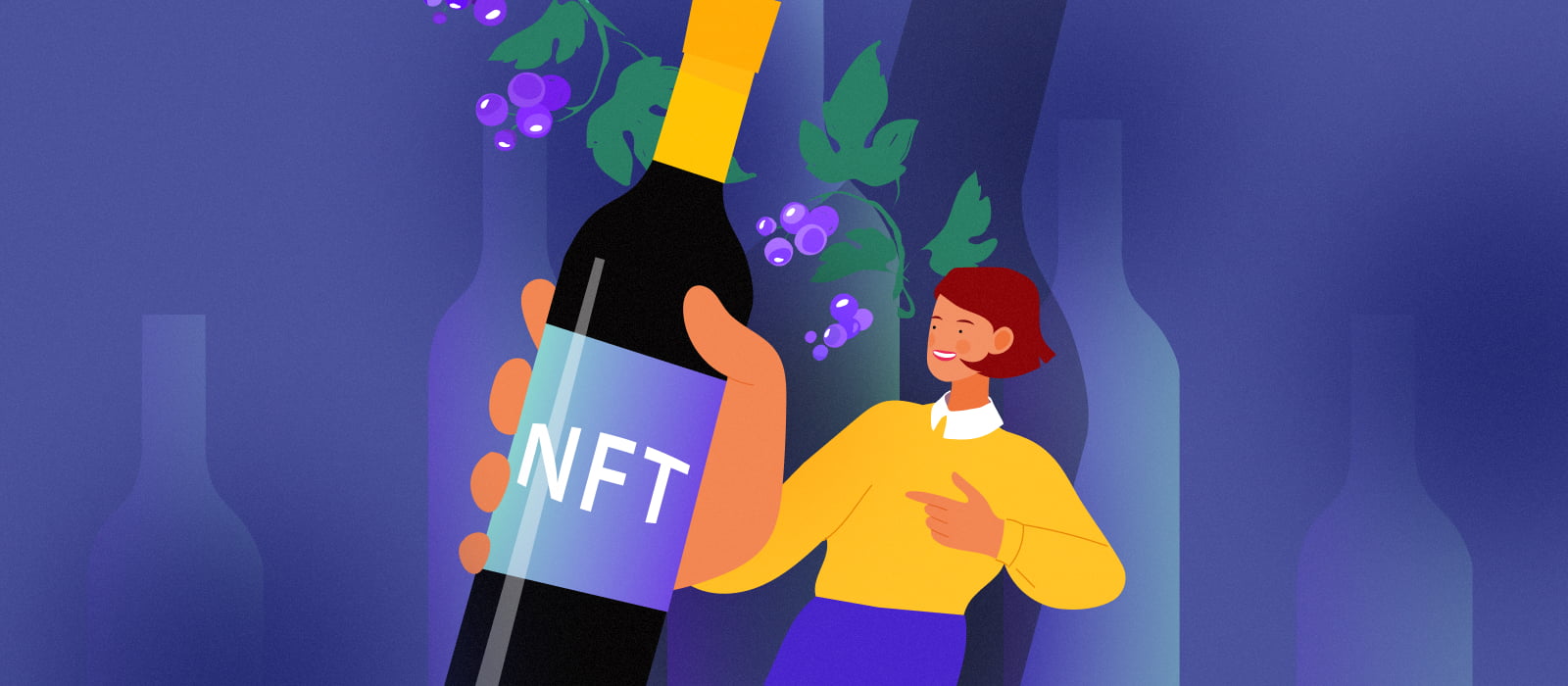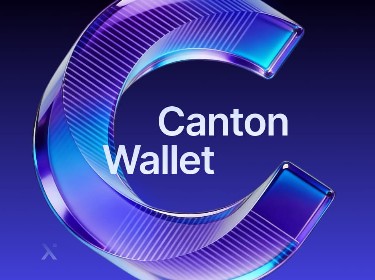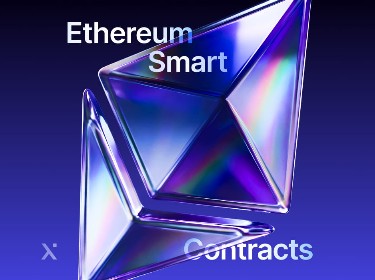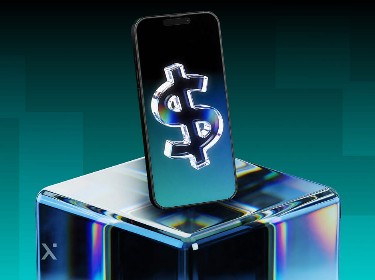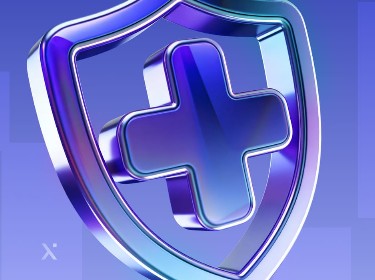NFTs are continuing to find applications across a variety of industries. They have proved to be useful in the wine business — one of the most unexpected domains.
The world shows no sign that it will sober up any time soon, with the wine industry being valued at $513,8 billion in 2022 and looking set to grow to $846,3 billion by 2032.
However, the numbers could climb even higher, now that wineries have started adopting NFTs and, as a result, are gaining extra publicity that attracts fresh investors and collectors.
But how is this mix being implemented? What benefits do NFTs bring to the table, and what brands already offer wine-lovers the novel experience of owning an NFT? Let’s find out in this article.
What are NFTs?
Non-fungible tokens (NFTs) are digital representations of unique assets from the virtual and real world. These can be artworks, music, game items, documents and even immovables like real estate. Once tokenized, the data about an item is recorded on the blockchain and is immutable, thus presenting a solid proof-of-ownership.
NFTs are traded on special marketplaces, such as OpenSea and Rarible. The prices are set in crypto and vary drastically — from a few dollars to millions. Currently, the most expensive NFT ever sold is “The Merge”, a digital artwork purchased for $91,8 million. The good news is that the majority of the tokens cost around $200: this means that the threshold for new NFT collectors is far from high.
Plenty of creators have found in NFT development a new way to monetize their works and avoid intermediaries and commission fees. What’s more, creators can set royalties that will be collected each time a token is resold.
Get acquainted with top NFT use cases across different spheres
Why does the wine industry adopt NFTs? Key benefits
There are several benefits which come with the adoption of NFTs by wine producers.These include:
- Wide media outreach — as non-fungible tokens are hyping, any winery releasing its NFT is bound to hit the headlines. Thus, brands reach out not only to their established customers but also extend their appeal to younger, tech-savvy audiences.
- Fraud prevention — it’s been reported that in the EU €2,8 billion is lost annually due to fraudulent wines and spirits. As NFTs carry the immutable metadata of the items they represent, they are a great weapon in the fight against counterfeit and forgery.
- New revenue streams — NFTs often come with royalties which are collected and sent to the creator each time the token is resold. Therefore, wine brands can receive additional income thanks to NFTs.
- Loyalty bonuses — Wine NFTs can be enhanced by exclusive experiences such as tasting events. Attractive deals like this will tempt NFT collectors and wine-lovers to obtain a token.
- Worldwide purchases — NFTs can be bought from any spot on earth, at any time of day or night, without the need for assistance from intermediaries or bank transfer permissions. This means that wine brands can significantly expand their customers’ geographic reach.
- Investments — non-fungible tokens can be used as a brand’s shares, allowing people to become part-owners of the winery.
What wineries offer NFTs?
![]()
Let’s take a look at five producers, from the historic Chateau Angélus to the modern Aubert & Mathieu winery, and see how NFTs fit their brands.
Yao Family Wines
Yao Family Wines is a winery owned by retired NBA star Yao Ming. In April 2021, it became the first winery in the world to launch a collection of wine NFTs. It consists of 200 tokens representing Yao Family’s exclusive 2016 Cabernet Sauvignon called “The Chop”. Each token comes with a real bottle of wine.
The NFTs can be bought at the OpenSea marketplace and on the official Yao Family website. The floor price is $868 (0,47 ETH). A percentage of proceeds will go towards supporting the Asian American community.
“Pairing this exquisite wine with a limited edition NFT should appeal to wine collectors, sports memorabilia collectors, NFT collectors, early adopters and anyone who appreciates the value of one-of-a-kind assets.” ― Jay Behmke, President of Yao Family Wines.
Chateau Angélus
Chateau Angélus is a historic family-owned wine brand. The winery collaborated with Cult Wines, a UK-based wine investment and collection management company, and released a one-of-a-kind NFT. This NFT is a 3D artwork of Chateau’s emblem, and is offered alongside a real-world barrel (which is 300 bottles) of Angélus 2020.
Chateau Angélus NFT was listed on OpenSea and sold for $110,000. The owner also got an invitation to a virtual tasting with Chateau Angélus’ CEO and co-owner, and a stay at the acclaimed Logis de la Cadène in France.
Penfolds Australia
Penfolds Australia is one of Australia’s oldest wineries, founded in 1844. Together with BlockBar, an NFT marketplace for wine and spirits, Penfolds Australia have recently released the third collection of its NFTs.
A BlockBar auction listed a rare 2018 Superblend Imperial Duo as two NFTs. However, there could be only one buyer. Each NFT was tied to an Imperial bottle of 6-liter Penfolds Superblend wine. Superblend Imperials are not available for public purchase in retail outlets, which made this deal even more special. Besides this, the purchaser was granted a complimentary 750ml bottle of each wine, and a private virtual session with Penfolds Chief Winemaker Peter Gago.
The NFT was sold for 9,43 ETH, which is equivalent to $17,430 at the time of writing.
Robert Mondavi Winery
Established in 1966, Robert Mondavi Winery is one of the top wineries in the US. In 2021, it released an NFT collection in partnership with French luxury porcelain house Bernardaud. These are 1,966 unique generative artworks, each coming with a porcelain bottle of 2019 Cabernet Sauvignon. The price for a Mondavi wine NFT is $3,500.
Aubert & Mathieu
Aubert & Mathieu winery was established in 2018 and is focused on transparent and sustainable production. The brand has recently released its NFT collection consisting of 250 tokens, each accompanied by six bottles of Pablo Maria Corbières 2019 red wine. Aubert & Mathieu tokens are available at OpeanSea at a price of 0,05 ETH or $90,62.
What wine NFT marketplaces are there?
As a result of the burgeoning interest in NFT wines, niche marketplaces are emerging, catering specifically to collectors wishing to add a wine token to their collections. We will take a look at the two most popular ones: Farandole and BlockBar.
Farandole marketplace allows buyers to access exclusive wine and spirits that would normally only be available to a limited group of people. Farandole offers a wide variety of spirits, including vintage editions, and accepts payments in fiat and AVAX crypto currency.
BlockBar is another platform enabling the trade in wine and spirits as NFTs. BlockBar works directly with the world’s top distilleries and biggest brands, helping them mint their own NFTs. Each token is tied to a real bottle of wine that is shipped to the buyer on request.
Wine NFTs in the metaverse
As the world is moving towards all-encompassing digitalization, it is natural that an asset as valuable as wine will be incorporated into the metaverse too. There are already several initiatives exploring the possibilities of introducing wine NFTs to this virtual environment.
For example, the soon-to-be-launched NFT Wine Club will be the metaverse’s first club of its kind. Alongside digital wine ownership, club members will get access to real-world vineyards in Napa, California, along with a play-to-earn game, educational workshops, and an annual NFT Wine Fest live event.
Currently, NFT Wine Club has a collection of 3,600 real-life vines tied to NFTs. Members will also be able to stake their NFT and earn community token GRAPE$ which can be used to purchase future NFTs or burnt for real wine delivery.
WiV, a blockchain platform set to create a secure global asset register and enable a more sustainable wine investment business, is likewise conquering the metaverse. It is developing two metaverse projects — wine venues in CryptoVoxel and in the Sandbox respectively. The locations will become centers of viniculture, helping to build relationships across the fine wine sector.
Want to know more about the metaverse? Read our detailed overview
Should your business invest in NFT wine?
![]()
NFT is a big money industry, projected to rise to a market cap of $97,6 billion by 2028. An NFT associated with wine — one of the most prestigious and profitable of collectibles — represents even more investment potential.
Let’s now see how your business can embrace wine NFTs.
First, if you are a winery owner, you can issue an NFT collection. To guarantee a warm reception from the collectors, you should carefully consider the following aspects:
- Marketplace — you can list your collection on a huge multifaceted platform like OpenSea or a niche one like BlockBar. In the first scenario, your NFT will attract a wider audience, whereas with the second option you will hit the true wine-lovers willing to spend considerable sums of money.
- Unlockable content — what perks will you offer alongside the token? The most obvious choice would be real bottles of wine. However, you can add something more unexpected, like a tasting, a winery excursion, or an invitation to a VIP party.
- Marketing — do thorough research on your established audience and the customers you want to attract. This way you will be able to work out a solid marketing plan, and you can also be sure the collection will gather a good deal of attention.
Another option for entering the wine NFT sphere is to build a corresponding platform. As the industry is only just beginning to gain pace, there remain openings available for reliable wine NFT marketplaces.
If you do decide to build one, the most important decision will be about determining which blockchain will be the foundation of your solution. The majority of NFT marketplaces are built on Ethereum; however, it has some considerable drawbacks, such as low transaction speed (13-15 transactions per second) and high energy consumption — Ethereum requires 80,65 TWh annually, the same amount as Chile.
As a result, developers have started to make use of other blockchains, with successful platforms being built on Flow, Binance Smart Chain, Cardano and Solana. When researching, you should scrutinize such aspects as scalability and security, as they will greatly influence the operation of the marketplace.
It is also vital to choose reliable blockchain developers who have experience in building NFT marketplaces and can deploy robust smart contracts.
Meet xtingles — a unique NFT marketplace for ASMR lovers
Conclusion
The NFT craze is still raging all over the internet, attracting new people into the world of blockchain and crypto. While art NFTs have become commonplace, the same cannot yet be said about wine NFTs.
With more and more wineries and world-renowned brands offering exclusive NFTs, the industry is gaining a boost in popularity and pulling in new customers — from investors to collectors and regular wine-lovers.
We’re fascinated to see how this curious collaboration is going to develop in future, especially as more and more sophisticated wine NFTs are released.
Want to freshen up your brand’s offerings with an NFT collection? Great idea! And our PixelPlex blockchain developers are consummate professionals who can help you with that.
Drop us a line and let’s create some awesome NFTs together.
